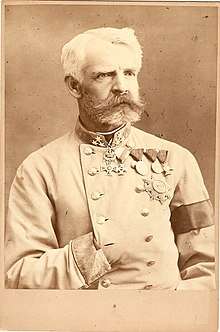Emanuel Cvjetićanin
Emanuel Cvjetićanin (Serbian Cyrillic: Емануел Цвјетићанин; Slunj, Austrian Empire, August 8, 1833 - Zagreb, Kingdom of SHS , 1919) was an Austro-Hungarian Feldmarschalleutnant, a rank equivalent to Lieutenant General.
Emanuel Cvjetićanin | |
|---|---|
 Feldmarschalleutnant Emanuel Cvjetićanin | |
| Born | 8.8.1833. Slunj, Austrian Empire |
| Died | 1919. Zagreb, Kingdom of Serbs, Croats and Slovenes |
| Allegiance | Austria-Hungary |
| Years of service | –1.11.1903. |
| Rank | Feldmarschalleutnant |
| Battles/wars | Commander in Bosnia and Herzegovina |
| Awards | Commander's Cross of the Order of Maria Theresa |
Biography
Emanuel Cvjetićanin, whose baptismal name was Manojlo, was born in the municipality of Rakovica, formerly the Slunj municipality. He had received his baptismal name from his father Alexander austrian officer born in Sadilovac 1807 and mother Vasilija Trbuhović, a Serb of Orthodox faith. The Cvjetićanin family belonged to an old Serbian family line, originating from the Raškan Bogunović tribe, who inhabited the northern parts of Montenegro, Dubrovnik, Herzegovina, northern Dalmatia, and Lika. Later, the tribe divided into several families, such as Bundalo, Kovačević, Cvjetićanin and others. He would attend the Theresian Military Academy, and later the family would move to Udbina in Lika.
During the Austrian occupation of Bosnia and Herzegovina, which lasted from 1878 to 1882, Cvjetićanin was the main organizer of the gendarmerie in Sarajevo. He received numerous decorations, including the Order of Maria Theresa, with which he received the title of baron, the "Knight's Cross", and the Military Merit Cross. He was the first adjutant of Emperor Franz Josef I and was in a second car behind of the Archduke Franz Ferdinand in Sarajevo when Gavrilo Princip assassinated him. King Alexander I of Yugoslavia offered him a post as one of his Field Marshals, but he refused the offer.
Emanuel's wife was Sofia Cvjetićanin, née Krivacić, and with her he had only one son, Milan Cvetičanin. Milan would end up changing his surname from Cvjetićanin to Cvetičanin, following a misunderstanding with his father, and move to Belgrade, where he had been transferred to the Serbian army as an Austrian officer under Živojin Mišić. As a Serbian administrative sub-officer, he would later end up dying on the 6th of October, 1917, alongside 21 other soldiers, in Saint-Mandrier-sur-Mer near Toulon in France. Emanuel would himself pass away two years later in 1919, in Zagreb, buried in Mirogoj Cemetery.
During the Second World War, a large number of members within Emanuel's wider family would perish as a result of the crimes of the Ustashe. On the 31st of July, 1942, in the Church of the Holy Virgin in Sadilovac, they were slaughtered and subsequently burnt. On the same day, 27 members of the Cvjetićanin family were also slaughtered and burnt in a mill of six wings. Emanuel had often visited his relatives in Sadilovac and had personally bought them the aforementioned mill on the Korana river.
Genealogy
Emanuel had a single wife, Sofia Cvjetićanin, with whom he had one child, named Milan.
Milan himself would marry two women; first Milica Birčanin Cvetičanin, and later Dara Cvetičanin; and all his children would be born during his time in Belgrade.
With Milica, Milan had four children:
- Sofia Cvetičanin
- Mane Cvetičanin
- Zagorka Cvetičanin
- Dušan Cvetičanin
With Dara, he had two children:
- Zdravko Cvetičanin
- Ljubica Cvetičanin
Photo gallery
 Emanuel Cvjetićanin
Emanuel Cvjetićanin Sofia Cvjetićanin, née Krivacić
Sofia Cvjetićanin, née Krivacić Milan Cvetičanin
Milan Cvetičanin
Sources
- Neuigkeits-Welt-Blatt, 5th of November, 1903. (AustriaN Newspapers Online; German Only)
- The Generality of the Austro-Hungarian Army, 1816-1918 (German Only)
- Military Order of Maria Theresa
- List of Lieutenant field marshals (German Only)
- Defeating Balkan Insurgency: The Austro-Hungarian Army in Bosnia-Hercegovina, 1878-82 (John Schindler)
- Licaner High Officers Throughout History (Serbo-Croatian Only)
- Infobiro Digital Archive (Bosnian Only, Dead Link)
- Vesti - The Forgotten Serbian Graves in France (Serbian Only)
- Ancestry - Re:Zec or Cveticanin (Serbian Only)